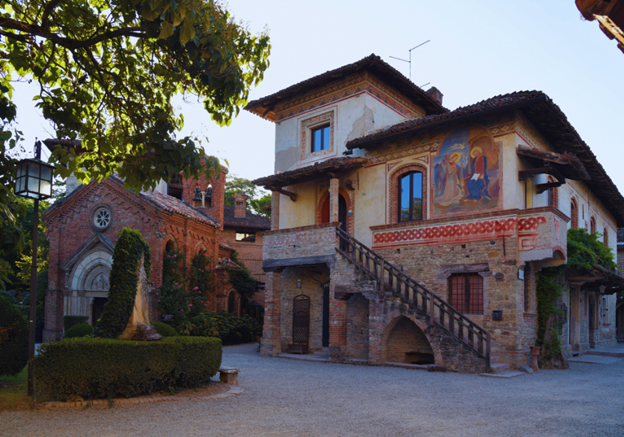How To Buy A House In Italy

There are many reasons one would want to buy a home in Italy; maybe because it’s one of the most beautiful countries in the world, or the people are super friendly, the food is great, or perhaps it is where their ancestors were from... and what else? Well, knowing that real estate prices are on average cheaper than in other EU countries (Spain and Portugal for instance) could be helpful when deciding to buy your dream home in Italy.
Can a US Citizen Buy Property in Italy?
EU citizens and citizens of a country with a bilateral agreement with Italy (like the U.S.) can buy real estate in Italy without restrictions. So theoretically, you don’t have to be an Italian citizen to purchase a house or land in Italy. However, owning real estate in Italy does not grant you any special residency visa. The standard tourist visa requirements continue to apply, and you will only be able to stay in Italy for up to 90 days every six months.
One of the many BENEFITS of having Italian citizenship by descent is that you can easily become a permanent resident of one of the 27 countries that are part of the European Union (Italy is one!), without the need to apply for a residency visa.
How Can You Find a Home in Italy?
Like in any other country; the best place to start is online. Some helpful sites for finding homes in Italy are www.immobiliare.it or www.idealista.it among many others (including Sotheby’s, Engel & Volkers, etc.). You can view regions all over the country, or narrow down your search area to a specific place you may be interested in by drawing it on a virtual map.
For those of you who are just getting started, the safest option is to spend some time in Italy to identify the area where you want to own a home. You can also hire a realtor to select properties that meet your requirements and show them to you while you are there. Plan to travel to Italy several times (which is quite THE plan!), because finding the “dream” home may not always be so easy. But suppose you are determined to make the move. In that case, exploring different regions and cities throughout Italy is a great way to become acclimated to the culture and get a better idea of what areas you connect with.

Useful Tips Before You Buy:
- Do your due diligence ahead of time — your qualified and trusted realtor or lawyer can guide you through the process to ensure the property can be legally sold and that any changes made to the building have been properly recorded. NOTE: A preliminary agreement (compromesso) is usually drawn up before the final sale (rogito). This document describes the terms of sale and commitment between buyer and seller regarding the future transfer of title. This is a legally binding document, so it is advisable to seek legal advice before signing. A down payment is required at the time of signing which is usually between 10% and 20% of the agreed purchase amount.
- Obtain a codice fiscale — all buyers of real estate in Italy need a tax code, which is an identification number used for all interactions with Italian government authorities, including tax authorities. You can get this code from your Italian embassy or consulate while abroad or the local Italian tax office if you are in Italy. Your codice fiscale will also be required to open a bank account in Italy ahead of your real estate purchase.
- Never purchase a home sight unseen — older places may have serious structural issues that you won’t be able to identify unless you are physically there.
- Make sure the seller actually “exists”. If they won’t meet in person and if their name is not on the deed, it’s probably not safe to proceed.
Please note that in Italy, all real estate transactions are overseen by a notary public (or notaio), a highly specialized lawyer representing the Italian government. The notaio ensures the legality of the transaction, including drafting the final contract, calculating taxes, and registering the property in the name of the new owner.
What Taxes and Fees Can Be Expected?
The closing costs associated with the purchase of a property in Italy vary based on its value, its location, the legal fees, etc. Here are some common closing costs:
- Notary Fees: The notary public is needed to validate the contract. Notary fees typically range between 1% and 3% of the property value. However, they also reflect the level of complexity of the transaction and the notary public involved.
- Realtor Fees: In Italy, both buyer and seller pay the real estate agent. If you are using a real estate agent, you will have to pay a commission. Typically, it ranges between 1% and 5% of the purchase price and it is calculated based on the RE agency, the geographic area, and the value of the property.
Both the notary’s fees and the real estate agent’s commission fees are subject to VAT or Value Added Tax. The standard VAT rate in Italy is 22% and it is payable on sales of goods or services. Taxes: Stamp Duty: 2% of the cadastral value if it’s a main residence or 9% of the cadastral value if it is a second home. If you are buying from a private person (not a Company) you do not pay any VAT.* Land Registry Tax or imposta catastale is a fixed fee that varies from Euro 50 (if you purchase the home from a private seller) to Euro 200 (if you purchase the home from a registered company in Italy).
*VAT or Value Added Tax is 4% for primary residences and up to 22% for second homes if you purchase the home from a registered company.
- Legal and Translation Fees: While it is not mandatory, if you are a foreign buyer, it is advisable to hire an attorney to oversee the real estate transaction. Unlike the notary public, an attorney can perform due diligence, negotiate on your behalf, and provide legal counsel. Legal fees may range between 4% and 5% of the purchase price. If you do not speak the language, you should also budget for the cost of a translator (approx. cost €300 – €400 or more).
In summary, while you do not need to be an Italian Dual Citizen to purchase a home in Italy, you may consider applying for Italian citizenship to be able to reside there for longer than the 90-day visa waiver allows. If your goal is to retire in Italy or move there permanently, do not wait any longer, start your journey now!
Book your FREE consultation NOW!
© 2024 MY ITALIAN FAMILY, LLC. All rights reserved.
